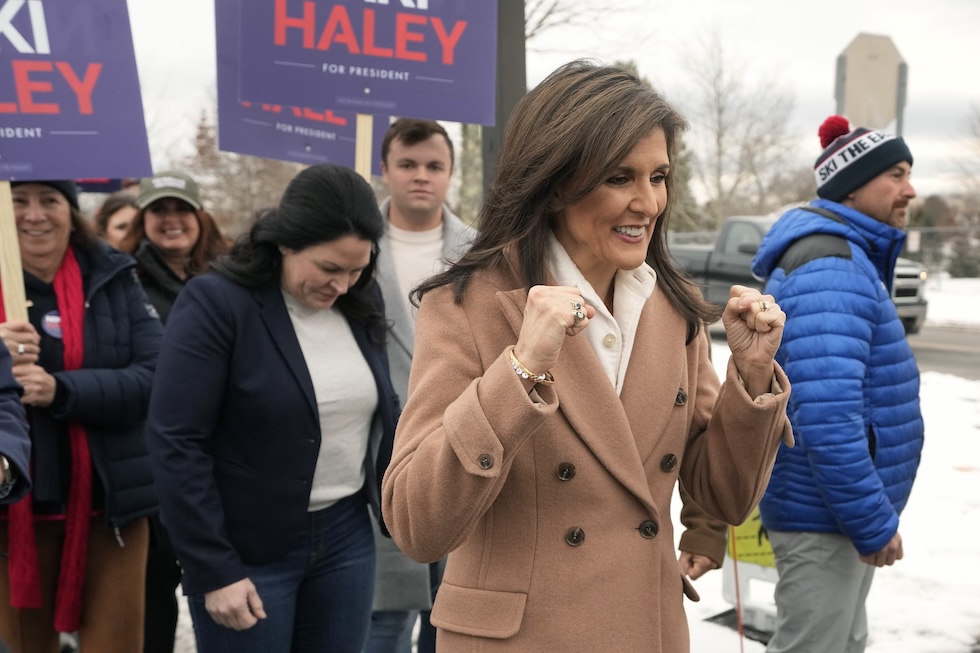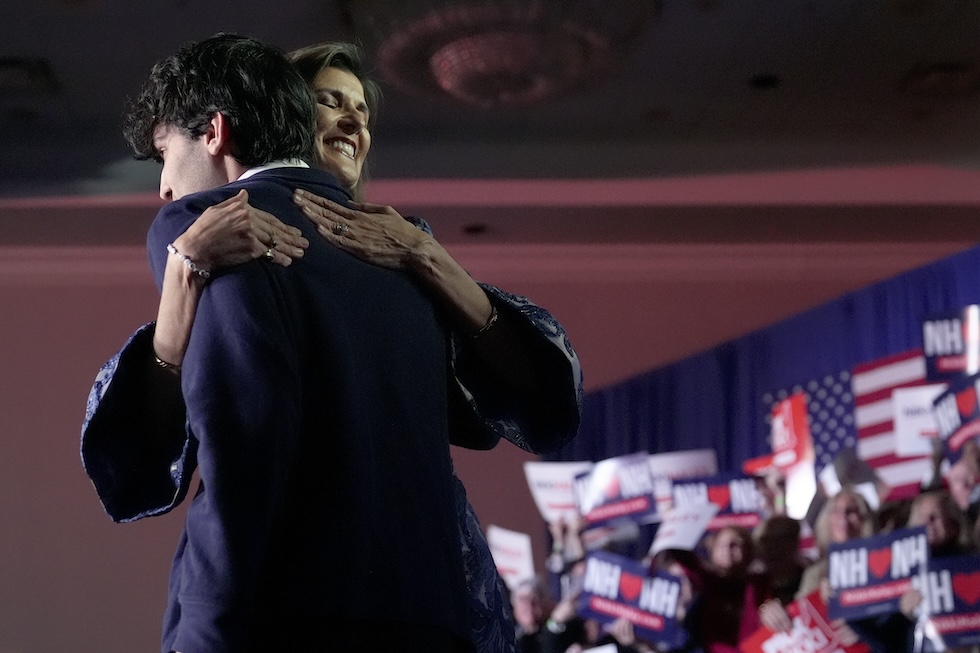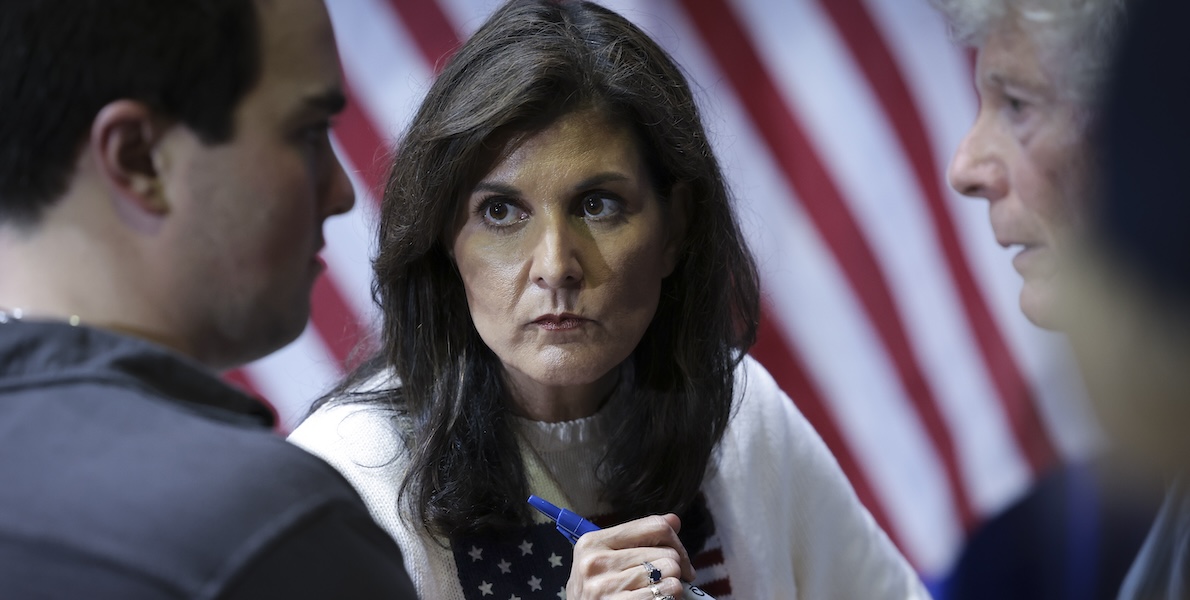loading
Republican Party voters will vote on Saturday in South Carolina to choose their candidate for President of the United States: this will be the fourth state in which primaries will be held, after Iowa, New Hampshire and Nevada. Donald Trump won the first three, and Nikki Haley is the only remaining contender after Ron DeSantis and Vivek Ramaswamy withdrew. South Carolina is the state in which Haley lives and where she served as governor for two terms (2011-2017), but it is lagging behind according to opinion polls. By about 30 percentage points Compared to the previous president. The same polls indicate that the situation is not much different in the upcoming states where voting will take place, including the fifteen states that will hold primary elections on March 5, in what is called “Super Tuesday.”
Right now, there is not a single state where Haley is favored, but not even a state where she can at least challenge Trump to victory. In the face of these possibilities, many assumed an imminent withdrawal from his candidacy. Hailey has always denied it, and she did it again Tuesday evening, in the speech that had the harshest and most aggressive tone towards Trump during his election campaign, which he delivered in front of about fifty people in Greenville, South Carolina. “I don't feel the need to kiss the ring yet,” he said, referring to many members of the Republican Party who “support him publicly, but secretly fear him, and are afraid to talk about him.” Even though they know that it is a “disaster” for the party.
Haley says she plans to continue her campaign until at least Super Tuesday, even if, as is likely, she loses in South Carolina. The hypothesis of a withdrawal on Sunday or in the following days remains possible, in the event of a particularly disappointing result or due to the resulting significant decline in donations from those who support the campaign. But for now, Haley rules it out: “I don’t understand this rush: In ten days there will be voting in twenty more states. “This is not Russia. We do not want one candidate to get 99 percent of the votes.”
But beyond her ambitions to defend the democratic process, Haley still has some reasons to stay in the race. None of them are related to real chances of victory, but rather to available funds, political positions, and the anticipation of possible unexpected events.

On the campaign trail in New Hampshire (AP Photo/Steven Senne)
In recent years, in the Republican primaries, it is usually not the moderate and traditional candidates who win, but the more extreme ones. Haley belongs to the first group, although she holds right-wing ideas. In Iowa, she came in third, in New Hampshire, considered the state she had the best chance of winning, she lost by 10 points, and in Nevada she was defeated not by Trump, but against “none of those candidates.” For reasons within the party, she participated in the Nevada primaries, and Trump in the caucuses, which is why she was not present among the candidates in the primaries: but even without opponents, Haley could not win.
After South Carolina, where the polls do not appear to be upside down, there are states on the primary calendar where the situation is very similar: seven of the 15 Super Tuesday states will allow only voters registered as Republicans to participate in voting, and not independents (those who do not officially recognize themselves as In any party, they are the group of voters among whom Haley has the greatest consensus), and most appoint delegates by a majority method: whoever wins wins them all. The primaries depend on the results in various states for each candidate She was appointed A certain number of delegates and at the summer conferences these delegates will decide the winner (1,215 are needed to secure the nomination).
But in primaries, it often happens that candidates withdraw not when their chances of winning run out, but when the funding runs out: the two are clearly connected, because few people are willing to invest in those who have no chance of winning, but at the moment it is not over. Haley's money.

With her son Nalin Haley (AP Photo/Charles Krupa)
January was the month The best ever To raise funds for his campaign committee, which amounted to $16.5 million, including $5 million after finishing second in New Hampshire. It appears that many donors, especially those motivated by a desire to avoid a second Trump presidency, have not given up yet: among them are some of the richest people, who fund so-called super PACs. In just one day, his committee raised $1 million, in the 24 hours that followed Trump’s statements attacking her husband, Michael Haley, a soldier currently deployed in Africa (Trump). He hinted He was there to get away from her.)
Before Super Tuesday Haley Plan an election campaign It will reach Washington, D.C., and seven states (Michigan, Minnesota, Colorado, Utah, Virginia, North Carolina, and Massachusetts) in seven days, with ten fundraising events among “high-profile” donors. However, at the same time, the election campaign in view of the most important appointment of the primaries is also very expensive: $ 500 thousand is scheduled to be allocated to television advertising investments alone in Michigan, where voting will take place on February 27. The expense-to-income ratio can determine how long Healey is willing to accept continuing to lose.
From a political perspective, staying in the race can also be an investment for the less immediate future. In recent weeks, Haley has noticeably stepped up her attacks on Trump: On Tuesday, she described him as “unstable and not quite himself, obsessed with his own demons” as well as “a bully, the kind I've been fighting my whole life.” His campaign has long insisted on how Trump would lead the party to defeat, and Haley has been saying for weeks that he could not win the presidential election “if he has to spend the next few months in the courtroom defending himself.” Himself from “The accusations are partly politically motivated.”
Even if she loses this primary, as seems likely, the 52-year-old Haley could recognize herself as Trump's main internal rival in the party: If he loses the presidential election against Democratic nominee Joe Biden, she will. To present herself as the person who would lead Republicans away from the extremist and radical model (at that point they had been repeatedly defeated in elections) and toward more traditional positions. However, if Trump wins, he will likely spend a certain amount of time away from the center of the party scene, which will then be quite consistent with Trump, but the exposure he gained in this campaign could still be used in 2028: four years, things A lot can change.
There is also a more likely reason for trying to stay in the race: the legal status of Trump, who is involved in four different criminal trials, and his candidacy has been called into question by some state courts. The Supreme Court, with a strong conservative inspiration, will weigh in on this last situation, which should ensure his participation in the elections, but the hearings in his criminal trials will begin on March 25. So far, the indictments have not swayed the Trump consensus, and perhaps the same will happen if convicted, but this requirement is entirely new and assuming the reactions and repercussions is complicated, if not impossible.
But there is no automatic mechanism to guarantee that whoever comes in second in the primary will replace first in the event of a waiver: delegates are the ones who make that decision at the convention. To take advantage of the event that prevents Trump from running, Haley would need it to happen soon, when the primary still has to award a majority of delegates. These are unlikely scenarios, but Haley might think it's worth waiting to see what happens a little longer, at least as long as there are donors to his campaign.

“Reader. Travel maven. Student. Passionate tv junkie. Internet ninja. Twitter advocate. Web nerd. Bacon buff.”






